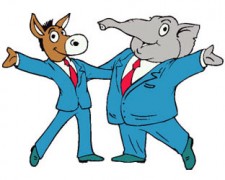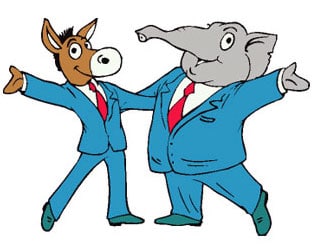 A group of groups called Public Interest Public Airwaves Coalition has petitioned the FCC to make changes to the political advertising disclosure process initiated during the 2012 election. Its primary concern is to make the information easier to use. It also urged the FCC to turn down a proposal offered by television operators.
A group of groups called Public Interest Public Airwaves Coalition has petitioned the FCC to make changes to the political advertising disclosure process initiated during the 2012 election. Its primary concern is to make the information easier to use. It also urged the FCC to turn down a proposal offered by television operators.
Network affiliates in the top 50 DMAs with the first stations subject to the new rules. They become universal during the next election cycle.
Members of the coalition include Benton Foundation, the Campaign Legal Center, Common Cause, Free Press, the New America Foundation and the United Church of Christ Office of Communication Inc., and the Sunlight Foundation.
The primary PIPAC suggestion is to include a requirement that political advertising date be submitted to the FCC in machine-readable format to improve accessibility and usefulness of the data. They also want to assure that the information is available in the same form both online on the database maintained by the FCC for this purpose and at the stations themselves.
In the filing, PIPAC wrote, “Adoption of this proposal would permit political file data to be easily aggregated and analyzed. The public would benefit from being better informed about important electoral races, issues, and the political process in general. It would allow the public, as well as the Commission, to better monitor broadcast stations compliance with statutory and regulatory requirements. Broadcasters would also be less likely to inadvertently expose sensitive financial information such as bank account numbers from uploading full contracts and checks. Further, it would significantly reduce paperwork burdens for broadcast stations.”
A coalition called Television Stations Group has filed a Petition for Reconsideration on the matter which PIPAC opposed. It believes that the proposal which would require stations to submit aggregated political date to the FCC for online filing while maintain complete records at the station itself will simply allow stations to hide inaccuracies and make it more difficult for citizens to use the data and monitor the stations.
RBR-TVBR observation: It still strikes us a completely remarkable that anybody anywhere thinks there is anything fair about a reporting regimen that forces television to make disclosures and doesn’t require any other medium to report so much as a penny.
Cable ads don’t count? Online advertising is meaningless? Newspapers are welcome to hide their rates?
Please. We cannot think of a more naked example of regulatory discrimination than this.
At any rate, after initially resisting the online reporting rules, NAB has pulled back, and all along had offered a solution similar to the one mentioned by the Television Stations Group as an alternative the royal mess of a system that was used in 2012.
It is our belief that there will not be a great need for an organization like PIPAC to keep stations honest – the political advertisers themselves should be able to handle that on their own. You can bet that if a politician or political action committee is being overcharged or denied access to the airwaves, they will make plenty of noise about it and bring down the full wrath of the appropriate regulatory bodies, the press and the public on the offending stations.





